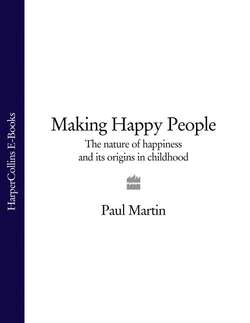Читать книгу Making Happy People: The nature of happiness and its origins in childhood - Paul Martin - Страница 28
9. Self-esteem
ОглавлениеIf you are a happy person, the chances are you will feel reasonably good about yourself as well as your life. You will have good self-esteem, to use the jargon. Self-esteem, which has become a somewhat overused term in recent years, is usually defined as how you judge your own worth or value as a person, both rationally and emotionally. The media and self-help books abound with glowing references to its magical powers.
Individuals with high self-esteem are generally found to be happier, healthier and better adjusted than those with low self-esteem. On average, they have better social relationships, cope better with illness and other problems, and are less likely to suffer from anxiety or depression. Studies have found that children who have high self-esteem are statistically less likely to be unemployed when they become adults; they also earn more on average and are less likely to commit crimes. Low self-esteem, on the other hand, can impair social relationships. If you are not happy about yourself, you will probably find it harder to be happy about your relationships with other people as well. Low self-esteem is also associated with a range of other problems including drug and alcohol abuse. Children with low self-esteem are at greater risk of becoming problem drinkers later in life.
Self-esteem is about liking yourself. This makes self-esteem different from satisfaction – which is about how you evaluate your life – and different from overall happiness. In principle, you could have reasonably high self-esteem yet still be dissatisfied with your life and generally unhappy, perhaps because of how you have been treated by other people. Having loads of self-esteem will not prevent you from being a miserable curmudgeon or a vicious swine.2 That said, self-esteem and satisfaction tend to be quite closely correlated. By and large, people who have high self-esteem are also likely to be satisfied with their lives.
The strength of the association between self-esteem and overall happiness varies according to the kind of society in which people grow up and live. In highly individualistic societies like the USA and UK, self-esteem has a fairly strong influence on overall happiness. However, the association is found to be weaker in more collectivist societies such as Japan, China, India, Bangladesh and Korea, where there is less emphasis on the self and more on harmonising with the group. For example, a study which compared students in the USA and Hong Kong found that maintaining harmony in personal relationship had a bigger influence on the happiness of the Asian students, whereas self-esteem loomed larger in the lives of their American counterparts.
High self-esteem can be a mixed blessing if it is built on self-delusion or vanity, as is sometimes the case. Moreover, trying to boost children’s self-esteem by praising them indiscriminately is not a quick way of making them happier or improving their academic performance, as some enthusiasts have claimed. Self-esteem is not all it is cracked up to be. We will return to its complexities and pitfalls in chapter 7.
